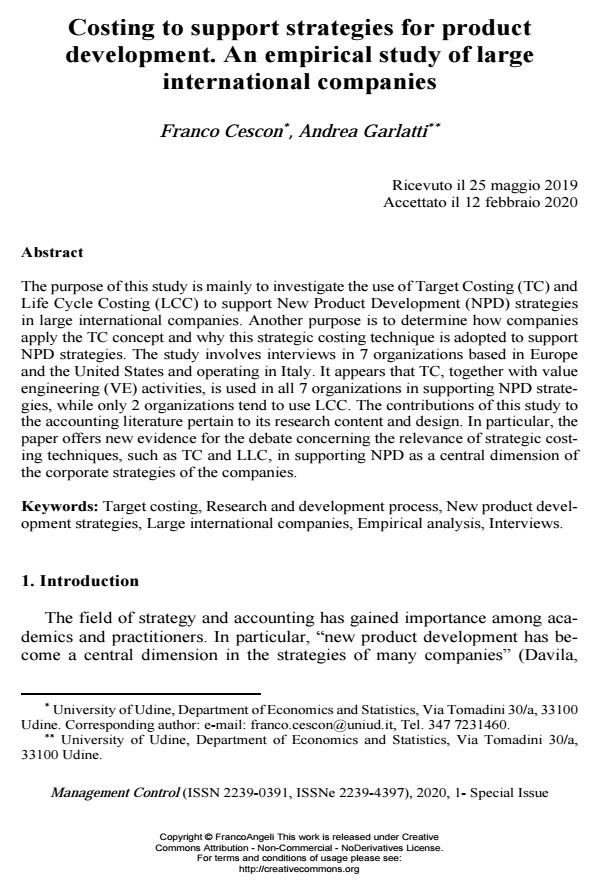Costing to support strategies for product development. An empirical study of large international companies
Titolo Rivista MANAGEMENT CONTROL
Autori/Curatori Franco Cescon, Andrea Garlatti
Anno di pubblicazione 2020 Fascicolo 2020/Suppl. 1 Lingua Inglese
Numero pagine 23 P. 127-149 Dimensione file 213 KB
DOI 10.3280/MACO2020-001-S1008
Il DOI è il codice a barre della proprietà intellettuale: per saperne di più
clicca qui

FrancoAngeli è membro della Publishers International Linking Association, Inc (PILA)associazione indipendente e non profit per facilitare (attraverso i servizi tecnologici implementati da CrossRef.org) l’accesso degli studiosi ai contenuti digitali nelle pubblicazioni professionali e scientifiche
The purpose of this study is mainly to investigate the use of Target Costing (TC) and Life Cycle Costing (LCC) to support New Product Development (NPD) strate-gies in large international companies. Another purpose is to determine how com-panies apply the TC concept and why this strategic costing technique is adopted to support NPD strategies. The study involves interviews in 7 organizations based in Europe and the United States and operating in Italy. It appears that TC, together with value engineering (VE) activities, is used in all 7 organizations in supporting NPD strategies, while only 2 organizations tend to use LCC. The contributions of this study to the accounting literature pertain to its research content and design. In particular, the paper offers new evidence for the debate concerning the relevance of strategic costing techniques, such as TC and LLC, in supporting NPD as a cen-tral dimension of the corporate strategies of the companies.
Keywords:Target costing, Research and development process, New product development strategies, Large international companies, Empirical analysis, Inter-views.
- Atkinson A., Kaplan R.S., Matsumura E.M., Joung S.M. (2012), Management Accounting. Information for Decision Making and Strategy Execution, Edinburg, England, Sixth Ed., Pearson Education.
- Bhimani A., Langfield-Smith K. (2007), Structure, formality and the importance of financial and non-financial information in strategy development and implementation, Management Accounting Research, 18, pp. 3-31.
- Bromwich M. (1990), The Case for Strategic Management Accounting: The Role of Accounting Information for Strategy in Competitive Markets, Accounting, Organizations and Society, 15(1/2), pp. 27-46.
- Bromwich M., Bhimani A. (1994). Management Accounting: Pathways to Progress, London, CIMA,
- Brownell P. (1985), Budgetary systems and the control of functionally differentiated organizational activities, Journal of Accounting Research, 23, pp. 502-512.
- Cadez S., Guilding C. (2007), Benchmarking the incidence of strategic management accounting in Slovenia, Journal of Accounting & Organizational Change, 3, 2, pp. 126-146.
- Cadez S., Guilding C. (2008), An exploratory investigation of an integrated contingency model of strategic management accounting, Accounting, Organizations and Society, 33, pp. 836-863.
- Cinquini L., Tenucci A. (2010). Strategic management accounting and business strategy: a loose coupling? Journal of Accounting & Organizational Change, 6, 2, pp. 228-259.
- Cescon F., Costantini A., Grassetti L. (2019), Strategic choices and strategic management accounting in large manufacturing firms, Journal of Management and Governance, 23, pp. 605-636.
- Cooper R. (1996), Costing techniques to support corporate strategy: evidence from Japan, Management Accounting Research, 7, pp. 219-246.
- Creswell J.W. (2014), Research Design. Qualitative, Quantitative, and Mixed Methods Approaches, Forth Edition, Sage Publications, Inc.
- Davila T. (2000), An empirical study on the drivers of management control system’s design in new product development, Accounting, Organizations and Society, 25, pp. 383-409.
- Davila A., Wouters M. (2007), Management, Management accounting in the manufacturing sector: Managing costs at the design and production stages, in Chapman C. S., Hopwood A.G. and Schield M. (Eds), Handbook of Management Accounting Research, pp. 831-858, Amsterdam, Elsevier.
- Flamholtz E.G. (1983), Accounting, budgeting and control systems in their organizational context: theoretical and empirical perspectives, Accounting, Organizatios and Society, 8, pp. 153-169.
- Guilding C., Cravens K.S., Tayles M. (2000). An international comparisons of strategic management accounting practices, Management Accounting Research, 11, pp. 113-153.
- Guilding C., McManus L. (2002), The incidence, perceived merit and antecedents of customers accounting: An exploratory note, Accounting. Organizations and Society, 27(1-2), pp. 45-59.
- Johson G., Whittinton R., Scholes K., Angwin D., Regnèr P., (2014), Exploring Strategy, Text and Cases, Pearson Education, United Kindon, Edingburg Gate.
- Jorgensen B., Messner M. (2010), Accounting and strategizing: A case study from new product development, Accounting, Organizations and Society, 35, pp.184-204.
- Kaplan R.S., Atkinson A.A. (1998), Advanced Management Accounting, Third Ed., New Jersey, Prentice Hall International. Inc.
- Kaplan R.S., Norton D.P. (2001), Transforming the Balanced Scorecard from Performance Measurement to Strategic Management: Part II, Accounting Horizon, 15, 2, June, pp. 147-160.
- Kato Y. (1993), Target Costing Support Systems: Lesson from Leading Japanese Companies, Management Accounting Research, 4, pp. 33-47.
- Malmi T. (2001), Balanced scorecards in Finnish companies: A research note, Management Accounting Research, 12, pp. 207-220.
- Mouritsen J. (1995), Management Accounting in Global Firms, in Ashton D., Hopper T., Scapens R. (Eds), Issues in Management Accounting, Second Edition, Prentice Hall, pp. 299-320.
- Moll J. (2015), Special issues on innovation and product development, Management Accounting Research, 28, pp. 2-11.
- Nixon B. (1998). Research and development performance measurement: a case study, Management Accounting Research, 9, pp. 329-355.
- Rockness H.O., Shields M.D. (1988), An empirical analysis of the expenditure budget in research and development, Contemporary Accounting Research, 4, pp. 568-581.
- Shank J.K., Govindarajan V. (1989), Strategic Cost Analysis. The evolution from managerial to Strategic Accounting, Richard D., Boston, Irwin.
- Simmonds K. (1981), Strategic Management Accounting, Management Accounting, 59(4), pp. 26-29.
- Simons R. (2014), Performance Measurement and Control Systems for Implementing Strategy, Edinburg, Essex, England, Pearson Education Limited, First Ed.
- Tervala E., Laine T., Korhonen T., Suomala P. (2017), The role of financial control in new product development: empirica insights into project managers’experiences, Journal of Management Control, 28, pp. 81-106.
Franco Cescon, Andrea Garlatti, Costing to support strategies for product development. An empirical study of large international companies in "MANAGEMENT CONTROL" Suppl. 1/2020, pp 127-149, DOI: 10.3280/MACO2020-001-S1008